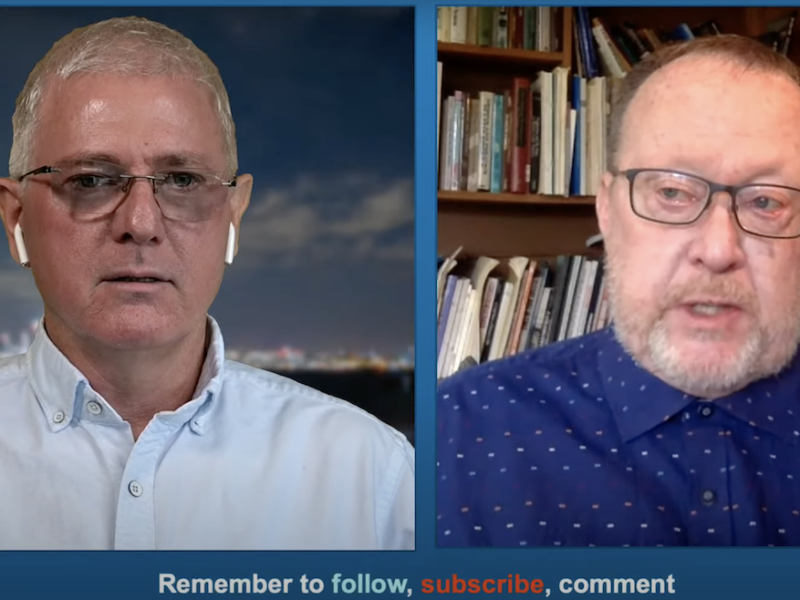Update: New Independent Information and Debate Platform PodTalk.Live calls for Foundation Members
Immediate Release
Source: Multimedia Investments Ltd

After a successful beta-launch in April PodTalk.live is now ready to invite people in New Zealand to register as foundation members. Foundation members are free to join the post and podcast social platform.
The Foundation Membership soft-launch is a great opportunity for founders to help shape a brand new, vibrant, algorithm-free, info discussion and debate social platform.
Developer of the platform, Selwyn Manning said: “PodTalk.live has been put to test by selected individuals and we are pleased to report that it has performed fabulously.”
Manning is founder and managing director of the company that custom-developed PodTalk.live – Multimedia Investments Ltd (MIL: milnz.co.nz).
MIL is based in New Zealand, where PodTalk.live was developed and is served from.
And now, PodTalk.live has emerged from its Beta stage and is ready for foundation members to shape the next phase of its development.
About PodTalk.Live:
PodTalk.live was designed to be an alternative platform to other social media platforms. PodTalk has all the functions that most social media platforms have but has placed the user-experience at the centre of its backend design and engineering.
PodTalk.live has been custom-designed, created and is served from New Zealand.
“We ourselves became annoyed at how social media giants use algorithms to drive what content their users see and experience. And, we also were appalled at how some social media companies trade user data, and were unresponsive to user-concerns” Selwyn Manning said.
“So we decided to create a platform that focuses on ‘discussion and debate’ communities, and we have engineered PodTalk to ensure the content that users see is what they choose – rather than some obscure algorithm making that decision for them.
“PodTalk.live is independent from other social media platforms, and at best will become an alternative choice for people who seek a community where they are the centre of a platform’s core purpose.
“And today, we invite people to sign up now and become foundation members of this new and ethically-based social community platform,” Selwyn Manning said.
PodTalk.live provides:
- user profiles with full interactivities with other users and friends
- user created groups, posts, video, images, polls, and file sharing
- private and secure one-on-one (and group) messages
- availability of all the above for entry users with a free membership
- premium membership for podcasters and event publishers requiring easy to use podcast publication and syndication services
- next-level community engagement tools that users all on the one platform.
In addition, PodTalk.live will host:
- Live audio and video webcasts with special guests and member talkback events
- premium video and audio podcasts (on-demand and live)
- premium posts on big issues from prominent writers
- featured documentaries on interesting and important topics.
Security Safety Moderation:
Security and safety has been baked into PodTalk’s function and culture. And at PodTalk, free-speech is welcomed but hate speech is rejected.
“With PodTalk, we recognise that many people, wherever they live, require security and at times anonymity so to avoid reprisals from authorities and other actors,” Selwyn Manning said.
“Along with a strong focus on security, and guidance on how to remain anonymous when necessary, we have built robust member-moderation into the core of PodTalk to ensure users are in control of their experience.”
“PodTalk has robust moderation tools so that members can easily block and report those who they feel disrupt their experience,” Selwyn Manning said.
And now, we invite all who seek an information, discussion and debating community to register as foundation members.
To do so, simply go to: https://PodTalk.Live and register. Once on the platform, members can familiarise themselves with what PodTalk.Live has to offer, and begin to create their own online community experience.
“We are working on audio-to-text multi-language translation+transcription tools, and will soon push the boundaries of cutting edge on-platform communication tools,” Selwyn Manning said.
The platform already has cutting edge tech, also smart community and premium publishing tools – including an invitation tool so you can invite your friends and grow your community.
PodTalk.live is founded on the belief that for social, political and economical progress to occur people need to discuss issues in a safe environment and embark on robust debate.
Register free as a founder. Check out the platform. See you there…
—
Contact Information
- Name: Selwyn Manning
- Title: Managing Director
- Phone: 021611958
- Email: selwyn@milnz.nz
- Contact Website: https://milnz.co.nz
- Social Media:
Podtalk Live
New Zealand: New Independent Information and Debate Platform PodTalk.Live calls for Foundation Members
Immediate Release
Source: Multimedia Investments Ltd

After a successful beta-launch in April PodTalk.live is now ready to invite people in New Zealand to register as foundation members. Foundation members are free to join the post and podcast social platform.
The Foundation Membership soft-launch is a great opportunity for founders to help shape a brand new, vibrant, algorithm-free, info discussion and debate social platform.
Developer of the platform, Selwyn Manning said: “PodTalk.live has been put to test by selected individuals and we are pleased to report that it has performed fabulously.”
Manning is founder and managing director of the company that custom-developed PodTalk.live – Multimedia Investments Ltd (MIL: milnz.co.nz).
MIL is based in New Zealand, where PodTalk.live was developed and is served from.
And now, PodTalk.live has emerged from its Beta stage and is ready for foundation members to shape the next phase of its development.
About PodTalk.Live:
PodTalk.live was designed to be an alternative platform to other social media platforms. PodTalk has all the functions that most social media platforms have but has placed the user-experience at the centre of its backend design and engineering.
PodTalk.live has been custom-designed, created and is served from New Zealand.
“We ourselves became annoyed at how social media giants use algorithms to drive what content their users see and experience. And, we also were appalled at how some social media companies trade user data, and were unresponsive to user-concerns” Selwyn Manning said.
“So we decided to create a platform that focuses on ‘discussion and debate’ communities, and we have engineered PodTalk to ensure the content that users see is what they choose – rather than some obscure algorithm making that decision for them.
“PodTalk.live is independent from other social media platforms, and at best will become an alternative choice for people who seek a community where they are the centre of a platform’s core purpose.
“And today, we invite people to sign up now and become foundation members of this new and ethically-based social community platform,” Selwyn Manning said.
PodTalk.live provides:
- user profiles with full interactivities with other users and friends
- user created groups, posts, video, images, polls, and file sharing
- private and secure one-on-one (and group) messages
- availability of all the above for entry users with a free membership
- premium membership for podcasters and event publishers requiring easy to use podcast publication and syndication services
- next-level community engagement tools that users all on the one platform.
In addition, PodTalk.live will host:
- Live audio and video webcasts with special guests and member talkback events
- premium video and audio podcasts (on-demand and live)
- premium posts on big issues from prominent writers
- featured documentaries on interesting and important topics.
Security Safety Moderation:
Security and safety has been baked into PodTalk’s function and culture. And at PodTalk, free-speech is welcomed but hate speech is rejected.
“With PodTalk, we recognise that many people, wherever they live, require security and at times anonymity so to avoid reprisals from authorities and other actors,” Selwyn Manning said.
“Along with a strong focus on security, and guidance on how to remain anonymous when necessary, we have built robust member-moderation into the core of PodTalk to ensure users are in control of their experience.”
“PodTalk has robust moderation tools so that members can easily block and report those who they feel disrupt their experience,” Selwyn Manning said.
And now, we invite all who seek an information, discussion and debating community to register as foundation members.
To do so, simply go to: https://PodTalk.Live and register. Once on the platform, members can familiarise themselves with what PodTalk.Live has to offer, and begin to create their own online community experience.
“We are working on audio-to-text multi-language translation+transcription tools, and will soon push the boundaries of cutting edge on-platform communication tools,” Selwyn Manning said.
The platform already has cutting edge tech, also smart community and premium publishing tools – including an invitation tool so you can invite your friends and grow your community.
PodTalk.live is founded on the belief that for social, political and economical progress to occur people need to discuss issues in a safe environment and embark on robust debate.
Register free as a founder. Check out the platform. See you there…
—
Contact Information
- Name: Selwyn Manning
- Title: Managing Director
- Phone: +6421611958
- Email: selwyn@milnz.nz
- Contact Website: https://podtalk.live
- Social Media:
Podtalk Live
New Independent Information and Debate Platform PodTalk.Live calls for Foundation Members
Immediate Release
Source: Multimedia Investments Ltd

After a successful beta-launch in April PodTalk.live is now ready to invite people to register as foundation members. Foundation members are free to join the post and podcast social platform.
The Foundation Membership soft-launch is a great opportunity for founders to help shape a brand new, vibrant, algorithm-free, info discussion and debate social platform.
Developer of the platform, Selwyn Manning said: “PodTalk.live has been put to test by selected individuals and we are pleased to report that it has performed fabulously.”
Manning is founder and managing director of the company that custom-developed PodTalk.live – Multimedia Investments Ltd (MIL: milnz.co.nz).
MIL is based in New Zealand, where PodTalk.live was developed and is served from.
And now, PodTalk.live has emerged from its Beta stage and is ready for foundation members to shape the next phase of its development.
About PodTalk.Live:
PodTalk.live was designed to be an alternative platform to other social media platforms. PodTalk has all the functions that most social media platforms have but has placed the user-experience at the centre of its backend design and engineering.
PodTalk.live has been custom-designed, created and is served from New Zealand.
“We ourselves became annoyed at how social media giants use algorithms to drive what content their users see and experience. And, we also were appalled at how some social media companies trade user data, and were unresponsive to user-concerns” Selwyn Manning said.
“So we decided to create a platform that focuses on ‘discussion and debate’ communities, and we have engineered PodTalk to ensure the content that users see is what they choose – rather than some obscure algorithm making that decision for them.
“PodTalk.live is independent from other social media platforms, and at best will become an alternative choice for people who seek a community where they are the centre of a platform’s core purpose.
“And today, we invite people to sign up now and become foundation members of this new and ethically-based social community platform,” Selwyn Manning said.
PodTalk.live provides:
- user profiles with full interactivities with other users and friends
- user created groups, posts, video, images, polls, and file sharing
- private and secure one-on-one (and group) messages
- availability of all the above for entry users with a free membership
- premium membership for podcasters and event publishers requiring easy to use podcast publication and syndication services
- next-level community engagement tools that users all on the one platform.
In addition, PodTalk.live will host:
- Live audio and video webcasts with special guests and member talkback events
- premium video and audio podcasts (on-demand and live)
- premium posts on big issues from prominent writers
- featured documentaries on interesting and important topics.
Security Safety Moderation:
Security and safety has been baked into PodTalk’s function and culture. And at PodTalk, free-speech is welcomed but hate speech is rejected.
“With PodTalk, we recognise that many people, wherever they live, require security and at times anonymity so to avoid reprisals from authorities and other actors,” Selwyn Manning said.
“Along with a strong focus on security, and guidance on how to remain anonymous when necessary, we have built robust member-moderation into the core of PodTalk to ensure users are in control of their experience.”
“PodTalk has robust moderation tools so that members can easily block and report those who they feel disrupt their experience,” Selwyn Manning said.
And now, we invite all who seek an information, discussion and debating community to register as foundation members.
To do so, simply go to: https://PodTalk.Live and register. Once on the platform, members can familiarise themselves with what PodTalk.Live has to offer, and begin to create their own online community experience.
“We are working on audio-to-text multi-language translation+transcription tools, and will soon push the boundaries of cutting edge on-platform communication tools,” Selwyn Manning said.
The platform already has cutting edge tech, also smart community and premium publishing tools – including an invitation tool so you can invite your friends and grow your community.
PodTalk.live is founded on the belief that for social, political and economical progress to occur people need to discuss issues in a safe environment and embark on robust debate.
Register free as a founder. Check out the platform. See you there…
—
Contact Information
- Name: Selwyn Manning
- Title: Managing Director
- Phone: +6421611958
- Email: selwyn@milnz.nz
- Contact Website: https://podtalk.live
- Social Media:
Podtalk Live
New Independent Information and Debate Platform PodTalk.Live calls for Foundation Members
Source: Multimedia Investments Ltd

For Immediate Release
After a successful beta-launch in April PodTalk.live is now ready to invite people to register as foundation members. Foundation members are free to join the post and podcast social platform.
The Foundation Membership soft-launch is a great opportunity for founders to help shape a brand new, vibrant, algorithm-free, info discussion and debate social platform.
Developer of the platform, Selwyn Manning said: “PodTalk.live has been put to test by selected individuals and we are pleased to report that it has performed fabulously.”
Manning is founder and managing director of the company that custom-developed PodTalk.live – Multimedia Investments Ltd (MIL: milnz.co.nz).
MIL is based in New Zealand, where PodTalk.live was developed and is served from.
And now, PodTalk.live has emerged from its Beta stage and is ready for foundation members to shape the next phase of its development.
About PodTalk.Live:
PodTalk.live was designed to be an alternative platform to other social media platforms. PodTalk has all the functions that most social media platforms have but has placed the user-experience at the centre of its backend design and engineering.
PodTalk.live has been custom-designed, created and is served from New Zealand.
“We ourselves became annoyed at how social media giants use algorithms to drive what content their users see and experience. And, we also were appalled at how some social media companies trade user data, and were unresponsive to user-concerns” Selwyn Manning said.
“So we decided to create a platform that focuses on ‘discussion and debate’ communities, and we have engineered PodTalk to ensure the content that users see is what they choose – rather than some obscure algorithm making that decision for them.
“PodTalk.live is independent from other social media platforms, and at best will become an alternative choice for people who seek a community where they are the centre of a platform’s core purpose.
“And today, we invite people to sign up now and become foundation members of this new and ethically-based social community platform,” Selwyn Manning said.
PodTalk.live provides:
- user profiles with full interactivities with other users and friends
- user created groups, posts, video, images, polls, and file sharing
- private and secure one-on-one (and group) messages
- availability of all the above for entry users with a free membership
- premium membership for podcasters and event publishers requiring easy to use podcast publication and syndication services
- next-level community engagement tools that users all on the one platform.
In addition, PodTalk.live will host:
- Live audio and video webcasts with special guests and member talkback events
- premium video and audio podcasts (on-demand and live)
- premium posts on big issues from prominent writers
- featured documentaries on interesting and important topics.
Security Safety Moderation:
Security and safety has been baked into PodTalk’s function and culture. And at PodTalk, free-speech is welcomed but hate speech is rejected.
“With PodTalk, we recognise that many people, wherever they live, require security and at times anonymity so to avoid reprisals from authorities and other actors,” Selwyn manning said.
“Along with a strong focus on security, and guidance on how to remain anonymous when necessary, we have built robust member-moderation into the core of PodTalk to ensure users are in control of their experience.”
“PodTalk has robust moderation tools so that members can easily block and report those who they feel disrupt their experience,” Selwyn Manning said.
And now, we invite all who seek an information, discussion and debating community to register as foundation members.
To do so, simply go to: https://PodTalk.Live and register. Once on the platform, members can familiarise themselves with what PodTalk.Live has to offer, and begin to create their own online community experience.
“We are working on audio-to-text multi-language translation+transcription tools, and will soon push the boundaries of cutting edge on-platform communication tools,” Selwyn Manning said.
The platform already has cutting edge tech, also smart community and premium publishing tools – including an invitation tool so you can invite your friends and grow your community.
PodTalk.live is founded on the belief that for social, political and economical progress to occur people need to discuss issues in a safe environment and embark on robust debate.
Register free as a founder. Check out the platform. See you there…
—
Contact Information
- Name: Selwyn Manning
- Title: Managing Director
- Phone: 021611958
- Email: selwyn@milnz.nz
- Contact Website: https://milnz.co.nz
- Social Media:
Podtalk Live
PODCAST PROMO: State of Israel Goes Rogue – Attacks UN Peacekeepers – Paul Buchanan and Selwyn Manning
A View from Afar – In this episode of A View From Afar political scientist Paul Buchanan and host Selwyn Manning analyse how the state of Israel has gone rogue, attacking United Nations peacekeepers in southern Lebanon. At this juncture it is clear this is an intentional attack.
Over the past week Israel Defense Force troops have repeatedly attacked UN peacekeepers who were authorised and deployed to the region by the United Nations Security Council.
Also last week; the Government of Israel issued a statement notifying the United Nations Secretary General that he was now banned from Israel and was persona non grata. Within a day of that statement, IDF troops had fired on UN peacekeeping positions in Southern Lebanon.
Since then, the IDF has continued operations that threaten the UN’s presence. And Israel’s prime minister Benjamin Netanyahu has now issued a directive to the UN peacekeeping force to withdraw from the area north of its borders in Southern Lebanon.
Also, despite the United States Biden Administration cautioning Israel on its attacks on UN personnel, overnight New Zealand time, the United States has deployed 100 US troops on the ground in Israel to operate missile defence systems.
In this podcast, Paul and Selwyn consider:
- Why Israel has begun to attack United Nations peacekeepers in the region?
- Why has the United States deepened its involvement in Israel’s so-called defence?
- What of Hezbollah, Hamas; are their attacks on Israel a defence or an attacking offensive?
- What of Iran, what is its position and will it engage in a full-scale war with Israel and what are the consequences should it do so?
INTERACTION WHILE LIVE:
Paul and Selwyn encourage their live audience to interact while they are live with questions and comments.
To interact during live recordings of A View from Afar podcasts, go to Youtube.com/c/EveningReport/
Remember to subscribe to the channel.
PODCAST – When All the World’s Failings End in Gaza
PODCAST: In this the tenth episode of A View from Afar for 2023 political scientist Dr Paul Buchanan and journalist/analyst Selwyn Manning examine the current Israel-Palestine Atrocities.
As we prepared for this podcast, representatives of Arab states have presented a united front at the United Nations, criticising the UN Security Council of doing nothing to protect civilians from Israeli bombing and missile attacks on Gazan civilians and locations.
Since then, the UN Security Council has considered two resolutions, the latter calling for a pause in hostilities to allow a humanitarian effort to enter Gaza to assist civilians.
The United States vetoed that Security Council resolution.
Al Jazeera has detailed that Israel forces have targeted and bombed civilian facilities include Hospitals, schools, residential areas resulting in the deaths of thousands of people, civilians, – around one-third of the deaths are children.
It remains contested by all sides in this conflict as to who, or what, is responsible for the deadly attack on Gaza Hospital, resulting in the deaths of over 471 people.
Additional to this, Israel has sealed the borders of Gaza while it prevents food, water and medical supplies from reaching civilians – in breach of international law requirements and laws of conflict.
Israel ordered Gazan civilians, who wish to get to safety, to get out of North Gaza and move toward the south, to the border with Egypt. But as people fled south toward what appeared to be safety, Israel bombed the southern Gaza region killing more civilians and sealing off that corridor for others who sought refuge.
As a consequence of the bombing, Egypt responded by sealing the Gaza-Egypt border.
Humanitarian aid now sits on trucks, waiting, on the Egypt side of the border, while United Nations officials implore Israel and Egypt to allow medical supplies, food and water to get through to those who are injured and dying.
The Israel Defence Force strikes followed a surprise-attack on Israeli citizens by soldiers operating under the Hamas banner.
Civilians were slaughtered and others taken hostage, only to be used as bargaining chips and leverage against their enemies.
Even Palestinian advocacy groups like the Palestine Solidarity Network Aotearoa suggested that breaches of international humanitarian Law, crimes against civilians, have been committed by those Hamas-aligned fighters. But they are clear, as others are too, that crimes against humanity, war crimes, have been committed by Israel, without consequence, as we all give witness to its response which is disproportionate, brutal, and disregarding of the thousands of Palestinian lives that have already been taken.
That’s the current situation. It is likely to get much worse.
In this episode, our questions will include:
What are the world’s leaders doing to stop the carnage?
Are the world’s nations being drawn into what will be an ever-expanding war?
Are we witnessing the beginning of a war where on one side authoritarian-led states like Russia, Iran, the wider Arab states, and possibly China stand unified against the United States, Britain, Germany, and other so-called liberal democratic allies representing the old world order?
Is what we are witnessing, what happens when a global rules-based order, multilateralism and institutions like the United Nations no longer have influence to prevent war, or restore peace and stability, or assert principles of international justice and enforce the rights of victims to see recourse to the law?
Why has this slaughter become an opportunity for the US and Russia to square-off against each other at the UN Security Council – a body that was once designed to advocate and achieve peace, but has now become a geopolitically divided entity of stalemate and mediocrity?
Eventually, will humanitarianism prevail? Will the world recognise that all people, the elderly, women, children, people of all ethnicities and religions, that they all bleed and die irrespective of their state of origin, when leaders of all sides, while sitting back in their bunkers, unleash weapons designed to kill as many people as is possible?
In this episode, Paul and Selwyn examine this most grave situation from a geopolitical vantage point. It may appear as dispassionate, and as so even disturbing, but we will take this approach in an attempt to aide an understanding of why this is happening in Gaza and why it is happening now.
INTERACTION WHILE LIVE:
Paul and Selwyn encourage their live audience to interact while they are live with questions and comments.
To interact during the live recording of this podcast, go to: Youtube.com/c/EveningReport/
You can also subscribe to A View from Afar Podcast on:
PODCAST: When all the world’s failings end in Gaza – Selwyn Manning, Paul Buchanan assess the crisis
By Selwyn Manning, editor of Evening Report
As we prepared for this podcast, representatives of Arab states have presented a united front at the United Nations, criticising the UN Security Council of doing nothing to protect civilians from Israeli bombing and missile attacks on Gazan civilians and locations.
Since then, the UN Security Council has considered two resolutions, the latter calling for a pause in hostilities to allow a humanitarian effort to enter Gaza to assist civilians.
The United States vetoed that Security Council resolution.
Al Jazeera has detailed that Israel forces have targeted and bombed civilian facilities include hospitals, schools, residential areas resulting in the deaths of thousands of people, civilians – around one-third of the deaths are children.
It remains contested by all sides in this conflict as to who, or what, is responsible for the deadly attack on Gaza Hospital, resulting in the deaths of at least 471 people.
Additional to this, Israel has sealed the borders of Gaza while it prevents food, water and medical supplies from reaching civilians — in breach of international law requirements and laws of conflict.
Israel ordered Gazan civilians, who wish to get to safety, to get out of North Gaza and move toward the south, to the border with Egypt.
Heavy bombing, sealed border
But as people fled south toward what appeared to be safety, Israel bombed the southern Gaza region killing more civilians and sealing off that corridor for others who sought refuge.
As a consequence of the bombing, Egypt responded by sealing the Gaza-Egypt border.
Humanitarian aid now sits on trucks, waiting, on the Egypt side of the border, while United Nations officials implore Israel and Egypt to allow medical supplies, food and water to get through to those who are injured and dying.
The Israel Defence Force strikes followed a surprise-attack on Israeli citizens by soldiers operating under the Hamas banner.
Civilians were slaughtered and others taken hostage, only to be used as bargaining chips and leverage against their enemies.
Even Palestinian advocacy groups like the Palestine Solidarity Network Aotearoa suggested that breaches of international humanitarian Law, crimes against civilians, have been committed by those Hamas-aligned fighters.
But they are clear, as others are too, that crimes against humanity, war crimes, have been committed by Israel, without consequence, as we all give witness to its response which is disproportionate, brutal, and disregarding of the thousands of Palestinian lives that have already been taken.
The View From Afar podcast on Gaza.
Getting worse
That is the grave current situation and it is likely to get much worse.
In this episode, Selwyn Manning and global security and geopolitics analyst Dr Paul Buchanan discuss the crisis yesterday:
- What are the world’s leaders doing to stop the carnage?
- Are the world’s nations being drawn into what will be an ever-expanding war?
- Are we witnessing the beginning of a war where on one side authoritarian-led states like Russia, Iran, the wider Arab states, and possibly China stand unified against the United States, Britain, Germany, and other so-called liberal democratic allies representing the old world order?
- Is what we are witnessing, what happens when a global rules-based order, multilateralism and institutions like the United Nations no longer have influence to prevent war, or restore peace and stability, or assert principles of international justice and enforce the rights of victims to see recourse to the law?
- Why has this slaughter become an opportunity for the US and Russia to square-off against each other at the UN Security Council — a body that was once designed to advocate and achieve peace, but has now become a geopolitically divided entity of stalemate and mediocrity?
- Eventually, will humanitarianism prevail? Will the world recognise that all people, the elderly, women, children, people of all ethnicities and religions, that they all bleed and die irrespective of their state of origin, when leaders of all sides, while sitting back in their bunkers, unleash weapons designed to kill as many people as is possible?




